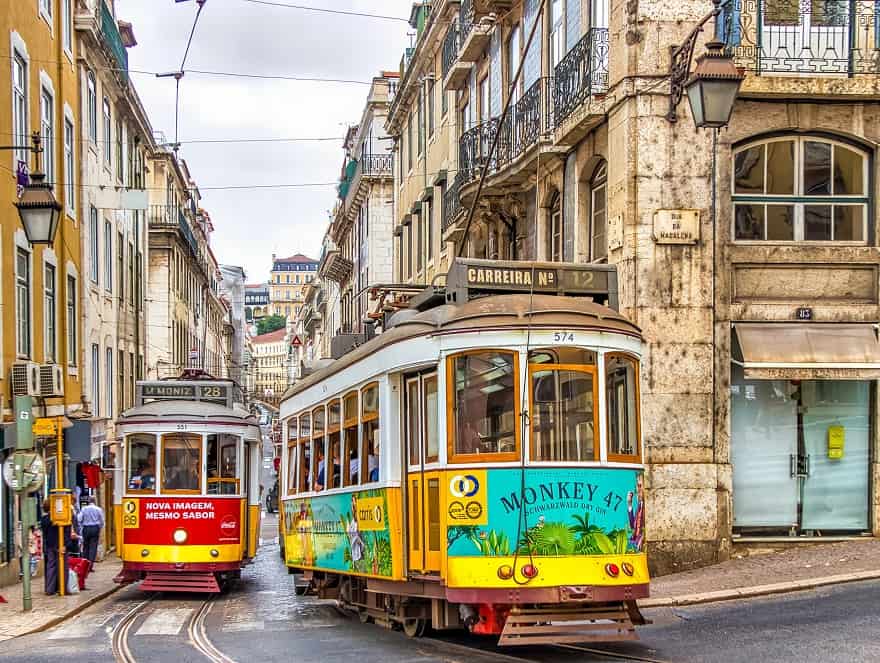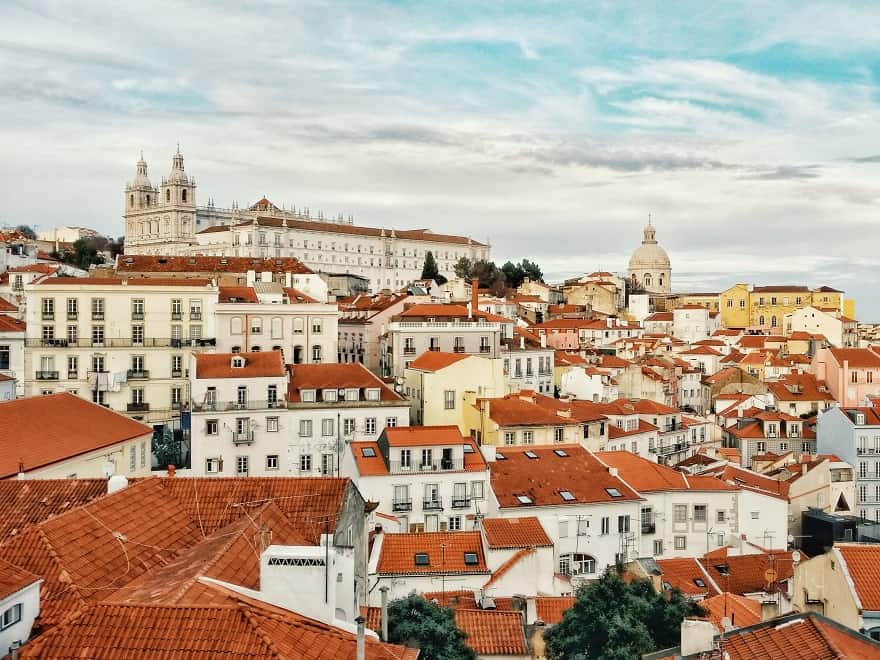Moving to Portugal from Dubai in 2021 takes careful planning and attention to details and documentation. We provide everything you need to know before moving from Dubai to Portugal. Start your move today by obtaining up to 6 competitive moving to Portugal quotations FREE.
People simply love moving to Portugal, and there are very good reasons for this. The country has the most beautiful beaches. The Portuguese people are warm and friendly, and the cities and towns are steeped with history but also share a welcoming progressive vibe. But these are not the only things that made Portugal a popular destination.
Like other European countries, Portugal offers free education and healthcare services to any taxpayer. It also provides one of the best social security benefits. And if you stay in the country for a longer time, you can enjoy the same rights if you go around other parts of Europe. So, if you long for the quiet countryside, thriving city centers, or something in between, Portugal’s got you covered.
So, here is the ultimate moving to Portugal guide.
The Portuguese Republic is consistently voted as one of Europe’s most visited countries. It’s strategically located on the continent’s southwestern tip, making it one of the region’s warmest countries. Lisbon, the country’s capital, has over 3,000 hours of sunlight every year.
And because it’s like summer most of the time in Portugal, anytime is the perfect time to hit the beach. The country has over 1,000 miles of coastline wherein you can find the most stunning beaches in the whole world, Ponta da Piedade included. You and your family can have the best times of your lives chilling here. As most of the travellers would put it, you have to experience the place to believe it.
However, this is just the tip of the iceberg. Aside from the weather and beaches, Portugal has so much to offer. We will get to know more of them as we go deeper into this guide. For now, all you have to do is sit back, relax, and prepare for the ultimate moving guide to Portugal.
Moving to Portugal is easy because people here are welcoming and tolerant of others who don’t share their culture and beliefs. But it will be easier if you also do share in learning about their ways of life.
Through this, you can show your respect for them and how much you appreciate them for welcoming you. And yes, knowing one’s culture, especially that of the country you’re relocating to, is the polite and ethical thing to do. Here are some of these practices you should know of.

Portuguese women greet other people by planting a kiss on each cheek, starting on the right. However, this is not a standardized behaviour, especially if you’re meeting someone for the first time. There are women who prefer kisses and others who don’t. When you’re in doubt, just wait for them to initiate the act.
Men, on the other hand, just greet with a simple handshake. Among close friends, this handshake can turn into a pat on the back or embrace. Among family members, this can even turn into kisses on the cheek, too.
Being greeted by strangers is pretty standard in the country. However, this doesn’t mean that they want to start a conversation with you. If you find yourself in shared spaces, queues, and waiting rooms with strangers, you can also greet them with bom dia (when it’s morning) or boa tarde (if it’s afternoon).

The first thing ex-pats should know about the Portuguese people is that they love their families and maintain very close ties with them. This explains why young people still live with their parents even if they’re already in their late twenties and thirties. Though this might be due to financial reasons, most children are vocal about how they loved their mothers’ cooking and how clean her laundry is. Most Portuguese households are very traditional. Household chores like cleaning and cooking are mostly left to the women of the home.
However, the thing that you should note is the fact that there’s a huge generational gap in behaviours and values. The majority of the country’s people are religious, conservative, and traditional, but the younger generations are more curious about current issues. They even advocate for such causes as social awareness across all age brackets and inclusion.
Almost 80% of the people in the country are Catholics. This only means that religion plays a massive role in the way people are brought up. On the other hand, a new study showed that over 50% of the younger generation label themselves as nonbelievers.
Portuguese people are, by nature, amiable. They are one of the most welcoming people to ex-pats. The language barrier is also not an issue because most of them speak English. As proof that the Portuguese are welcoming to the ex-pats, they go out of their way to make themselves clear - whether in gestures or language. However, when it comes to friendships and social circles, they tend to stick to their Portuguese group of friends and usually keep the ex-pats away. If you want to assimilate into their culture and ways of life altogether, learn their language.
In public, expect to see Portuguese people be quiet. Speaking loudly or listening to loud music is frowned upon. Then again, going out for drinks or dinner is an entirely different store. In these settings, they tend to be louder, relaxed, and more outgoing.
Seafood is also something abundant in the country. Since it's surrounded by water, it’s normal to find steam clams, grilled octopus, and fresh fish on the menu. If you’re in the mood for lobsters, cod, and sardines, Portugal can satisfy your cravings. And if you feel like you already have too much seafood, you can try sausages, olive oils, and cheese.
Anyone moving to Portugal who has a sweet tooth is definitely in for several treats. Desserts are very popular in Portugal and there are many artisans famed for creating delicious cakes, pastries, and tarts.
Like other countries, the cost of living in Portugal will largely depend on which part of the country you decide to live in. Cascais and Lisbon are the top two most expensive Portuguese cities. Next to them is Porto, which is also costly, especially when it comes to renting prices.
If you’re asking whether or not it’s expensive to live in this part of the world, the answer would be no since it’s still one of the least expensive countries in Western Europes. The problem is actually on the high rent prices and low salaries. Even if the cost of living is low, life can still be challenging if you have low pay and expensive rent to pay.
Living in this country can be divided into two - living in the cheaper and less enticing east side areas and settling in the most appealing and expensive south and west coasts. Most of the former cities and regions are deserted, so you can’t find employment opportunities here.

If you want to enjoy a less expensive lifestyle in Portugal, you can choose to live in Coimbra, Viseu, and Brage. Rent in these areas will only range somewhere between 300 to 500 EUR per month. You won’t have to spend that much on leisure activities, eating out, and groceries, either.
The good news for ex-pats parents who will be bringing their kids with them in Portugal is that the country offers free education to its residents for those who will enrol in the mandatory school levels.
Let’s suppose you want to register your kids to private institutions. In that case, you have to prepare for some education expenses that would cost 300 EUR per month for preschool, 400 EUR per month for primary education, 800 EUR for an international school, and 3,000 EUR for university level.
If you want to enjoy a less expensive lifestyle in Portugal, you can choose to live in Coimbra, Viseu, and Brage. Rent in these areas will only range somewhere between 300 to 500 EUR per month. You won’t have to spend that much on leisure activities, eating out, and groceries, either.
A foreigner can buy a car in Portugal if, and only if, you have proof of your Portuguese domicile, a tax number, and proof of your identity. The only challenge here is the amount of taxes that you have to pay when you buy a foreign car, European vehicles included. So, if you intend to own a car while living in this country, it’s wiser to buy a local car.
If you do choose a local car, expect to pay 30% more than the global market’s car price. There’s even an unwritten rule among ex-pats stating that if the vehicle you own or intend to buy is less than 10,000 EUR, better sell it or pass it up and just buy one when you reach the country.

OF LIVING IN PORTUGAL
Unlike relocating to other countries, Portugal’s relocation process is very straightforward as long as you follow its customs regulations and rules. This is particularly true if your belongings are coming from countries outside of Europe. If you are not mindful of these rules, expect your belongings to get stuck at customs. Take note; it will take a good deal of patience and persistence to reclaim your belongings.
To claim your things, make sure to present your luggage certificate or Certificado de Bagagem. This is a document that you can claim from the diplomatic mission or the Portuguese consulate. Aside from this, you also need to prepare a complete inventory of all your transported possessions. Expect your belongings to arrive not more than 90 days after you move to the country.
Considering the country’s geographic location, you can choose to bring your goods either by sea, road, or air freight. If you want a faster transaction, go for air freight. Take note, however, that this is an expensive option. Transporting your items by sea may be affordable, but it can be slow. If you’re looking for a balance between speed and cost, and you are moving to Portugal from Europe, go for road freight.
When moving to Portugal from Dubai, importing Household Goods and Personal Effects, you will require the following documents;
For a more in-depth look at documentation please check the International Association of Movers.
If you’re a resident of any EU country, you won’t need a visa to enter Portugal. Residents of other states need to secure a visa. The right visa for any applicant will depend on the purpose of the stay. If you want to work here, you can choose to apply for a work visa or self-employment visa. If you’re going to reunite with your loved one living in the country, you can apply for a family reunification visa.
If you’re a skilled worker, you can apply for an EU blue card before you can get a skilled worker visa. If you’re a national of a non-EU country, you need to request a residence permit when you arrive in the country. Five years later, you can already apply for permanent residency.
The process of applying for a visa will depend on your purpose and nationality. However, take note that generally, you need to get a visa to qualify for the issuance of visto para obtenção de autorização de residência or authorization of residence. Your visa will be valid for four months. You can enter the country two times within this time frame and apply it with SEF for your residence permit. The types of visa you can apply for are:

To apply for any of the visas mentioned above, you need to satisfy the following requirements at the time of your application:
Another aspect of the moving process you need to pay careful attention to is your bank account and taxes. You need to have your tax number (NIF) if you want to open a Portuguese bank account. This rule applies to residents and non-residents. If you belong to the latter category, you’ll need a tax representative to get your NIF. You can apply for a particular tax regime to only be taxed 20% of your total income in terms of taxes.
Yes, foreign nationals are free to open a bank account in the country. Most banks require that you visit their branch to complete this task. If you are allowed to initiate the bank account opening process online, you will still be asked to visit the branch to complete the process. And though the requirements vary from bank to bank, here are the standard requirements you need to comply:

Here are the top and biggest Portuguese banks most ex-pats trust:
There are several tax types in Portugal, but the most relevant are value-added tax, corporate tax, social security, and income tax. If you’re a resident, you will be required to pay taxes if you live in the country for at least 183 days of the current tax year.
The tax system in the country is progressive. This means that the higher your income, the more taxes you need to pay. If you make 653 EUR or less every month, you will be exempted from paying taxes. If your monthly income is more than 80,641 EUR, expect to pay the highest tax rate - 45.3%.
The most common way of paying your bills when in the country is by making a direct debit. For your electricity bills, aside from direct debit, you can also use Multibanco ATM to settle your account. Payment of your water bill is usually incorporated in your rent, so you only need to pay this to your landlord.
The country’s climate is warm-temperate, with a distinctive wet season during winter. In colder seasons, the country experiences the same temperature patterns as the coastal towns of Spain. This means that the daytime temperature is usually at 16 degrees Celsius. The same cannot be said for the Portuguese resorts that experience wetter days, with only 14 dry days. They also have only five to six hours of sun per day.
70%
6
22oC/72oF
3
65%
31oC/88oF
16oC/61oF
6oC/43oF
If you are renting a house in Portugal, expect the rate to vary between cities. Of course, you can expect the rent to go as high as 1,100 to 1,500 per month in Lisbon and Porto. If you want to stay in Setubal, Beja, and Faro, know that the rent prices in these areas are still in the expensive range, so be prepared to pay 690 to 880 EUR per month.
If you want to save on rent, you can choose to live in the cheapest districts like Guarda, Portalegre, Castelo Branco, Vila Real, and Santarem. In these areas, the house rents range between 350 to 420 EUR per month.
Yes, you can, for as long as you have enough funds to pay for it. Houses in the country normally cost around 250,000 EUR. In the most expensive districts, it could go as high as 330,000 EUR. The cheapest areas include Santarem, Beja, Guarda, Portalegre, and Castelo Branco. Here, the properties only cost somewhere between 125,000 EUR to 155,000 EUR.

As mentioned earlier, one of the most enticing things about Portugal is its free and accessible public healthcare system. Aside from being free, both the private and public healthcare sectors offer excellent services, as reflected in their high life expectancy and higher vaccination rates.
The country has both private and public medical healthcare. But medical centers, hospitals, and other medical institutions are either private or public - never both. The country’s life expectancy is at 81 years, making them the highest in the entire EU. The unfortunate thing, however, is that the government is now spending less on healthcare subsidy. As a result, out-of-pocket expenses are on the rise.
The public aspect of the country’s healthcare is managed by the country’s national healthcare system called the Serviço Nacional de Saúde (SNS). To enjoy the state-provided medical services, you have to register yourself with the junta de freguesia or local council. Here, you will need to request for your address proof, a document you’ll need to register with a local healthcare centre or centro de saude. You need to present your work visa and título de residência or residence card for this.
Once you’re registered with a specific health center, you can now get your healthcare number or Número de Utente. You will need this when you need to access the country’s public healthcare services.
Fortunately, yes, the country has state-funded healthcare that is free for legal residents and citizens alike. But though this is free, it doesn’t mean you won’t have to pay anything. The additional cost could be somewhere within 5 to 20 EUR.
The country’s free public healthcare covers all medical procedures, except for cosmetic surgery and dental care. This also includes the diagnosis and treatment of non-urgent and emergency conditions and preventive care. There are quite many hospitals all over the country. Every municipality is also covered by local health centers that provide primary medical services.
School in Portugal is mandatory for those between six to 18 years old. During this time, if you enrol your kids in public schools, their education is free. The same rule applies to foreign residents.
Like in other foreign countries, you can find private and public in the country, though you can always opt to pay more for your kid’s education if you want the best quality education. The best schools in the country are usually private institutions that are mostly Catholic ones. If your children are already in college, it is best to go to state universities. The most prominent and prestigious universities in the country are state-run and only require a 900 EUR co-payment or less per year. On the other hand, private universities are more expensive, but only a few of them made it to the world’s best universities list.
Portuguese public schools are state-funded. In terms of quality, you can say that the country’s public education has been continually improving as the year’s pass. The public schools are still plagued with issues like lower graduation rates and ageing teaching staff.
The state-run schools usually teach their curriculum in Portuguese. So, if your child does not speak this language, it’s better to enrol him in a private international school. In the latter, you can choose a school that adheres to the country’s curriculum to be easier to integrate into public schools.
These private schools are often viewed as superior in terms of academic excellence compared to public schools. They also tend to be stricter with school rule compliance, attendance, and school rules. Parents prefer this setting because they want their kids to value education and have a better academic foundation.

Moving to a different country can be daunting, and if you don’t get on top of things it can become quite stressful. Moving to Portugal presents its own set of unique challenges, but if you follow the guidelines we have provided, we feel certain you can experience a smooth relocation to Portugal.
You can start the ball rolling by completing our simple form, allowing international movers to get started on your quotation, today!
Note: This document is provided as a guide for people moving to Portugal and for information purposes only. Customs regulations can and do change at any time, usually without notice. Your mover will provide you with more information.
